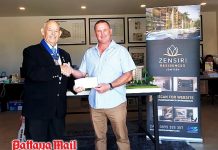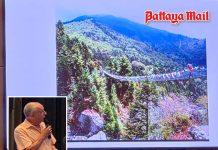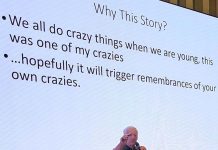If you live in Thailand, you may someday be able to rent a six-passenger electric tuk tuk “limo” for that very special occasion. This was part of the message to the Pattaya City Expats Club on Sunday, August 4 from Dennis Harte, Thailand’s Managing Director of the Tuk Tuk Factory, which manufactures custom electric tuk tuks in Thailand. He spoke about what types of tuk tuks they make, where they sell them, and their future marketing plans.
Dennis is an industrial designer, engineer, and entrepreneur. He told his audience that in the summer of 2007, there were 55 Thai tuk tuks introduced in Amsterdam as taxis.
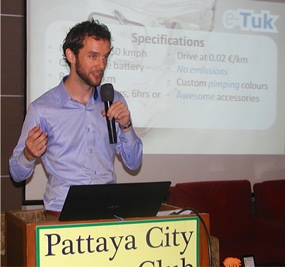 Speaker for Pattaya City Expats Club for August 4th was Managing Director of the Electric Tuk Tuk Company, Dennis Harte of Holland. They manufacture the vehicles in Samut Prakarn (SE of Bangkok) for export to many countries.
Speaker for Pattaya City Expats Club for August 4th was Managing Director of the Electric Tuk Tuk Company, Dennis Harte of Holland. They manufacture the vehicles in Samut Prakarn (SE of Bangkok) for export to many countries.
They were driven by students for the summer tourist season. Customers loved them but each tuk tuk was different and when it came time to repair them, the students did not know how to do this. In addition, there were safety issues trying to adapt the tuk tuks to European laws. Dennis said in 2007, he was hired to work on a development project for the dynamic Tuk Tuk Company in the Netherlands (the company that had imported the tuk tuks for use as taxis).
Dennis and his fellow entrepreneurs saw a business opportunity. They created a new company in Holland – the Tuk Tuk Factory – with the idea of producing electric tuk tuks. Dennis and his partners figured they could manage to keep the costs down if they kept the specifications low. But this was 2008; the start of the economic collapse, so money from investors was hard to come by. Instead, Dennis recounted, the company asked for, and received, a subsidy from the Dutch government to test different models of tuk tuks. In 2010, the company formed a Thai partnership in Thailand to develop the electric powered tuk tuks. During development, Dennis said, the company went through three different prototypes before settling on one.
In 2011, the Tuk Tuk Factory set up another Thai company to manufacture the tuk tuks. Two models were produced, a basic three-passenger model and a “limo” six-passenger one. In 2012, tons of paper work later, and having obtained a licence, the company started production. By March 2013, the first 100 tuk tuks had been manufactured. The Tuk Tuk Factory is now producing 12 tuk tuks a month. The tuk tuks are all made to order and customised to the buyer’s preferences. The company has 30 full-time employees, 18 in Thailand (production) and 12 in Amsterdam (marketing). Dennis said that he was hopeful that 2013 would be the year that his company starts to show a profit.
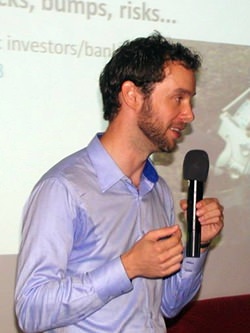 Dennis concluded by mentioning the unforeseen hazards that can befall new entrepreneurs – including an accident that ended with a prototype submerged in a canal.
Dennis concluded by mentioning the unforeseen hazards that can befall new entrepreneurs – including an accident that ended with a prototype submerged in a canal.
The three- and six-passenger models have a range of 70-80 kilometres (before the battery has to be recharged) and can go at speeds of up to 50 kph. The 72-volt battery weighs 400 kg, almost half the weight of the vehicle. Customers can choose from lithium or lead acid batteries. The company also produces a cargo model, and a larger vendor model that can be used to sell products from the back of the vehicle.
Dennis mentioned that the market for the three- and six-passenger tuk tuks in Europe is city tour companies, large hotels, resorts, airports and exhibition halls. His company sold one tuk tuk to a ski resort in Europe; that tuk tuk had to be able to drive through snow. Further, he sees two marketing opportunities for electric tuk tuks in Thailand; for use on islands and in cities. His company is currently looking for a Thai distributor and has already received expressions of interest from potential customers. Since the models they manufacture are intended for foreign markets and must meet their standards, they are more costly than the gasoline powered tuk tuks currently sold in Thailand; he said the three-passenger model costs about 400,000 baht. The company hopes to produce a lower-cost version in future for the Thai market.
During the Question and Answer session, Dennis explained that in comparison with golf carts, the tuk tuks are more exotic, offer a choice of interior and exterior colours, and have a more powerful drive train. Also, only the tuk tuks come in a six-passenger model.
Besides tuk tuks, Dennis’ other interests are cycling, running, sketching, computer games, furniture design (he even constructs his own furniture), travelling, and taking care of his exotic plants. To learn more about the Tuk Tuk Factory, visit: www.tuktukfactory.com.
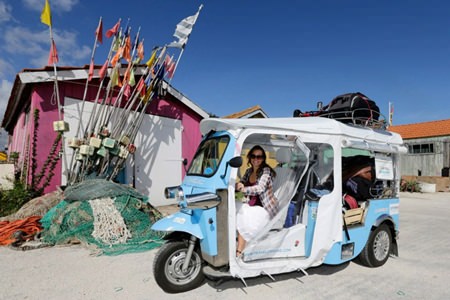 Touring in an Electric Tuk Tuk.
Touring in an Electric Tuk Tuk.
After Dennis’s presentation Master of Ceremonies Richard Silverberg brought everyone up to date on upcoming events, then called on Roy Albiston to conduct the interesting and informative open forum where questioned are asked and answered about Expat living in Thailand.
To learn more about the Pattaya City Expats Club and its many activities, visit www.pattayacityexpatsclub.com.
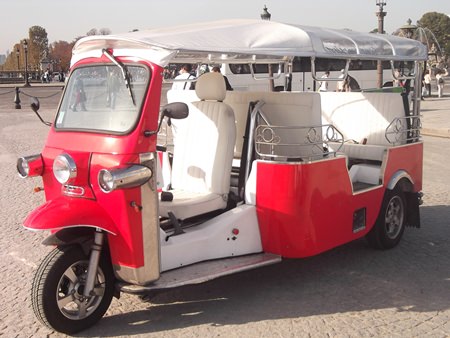 Electric Tu Tuk (Limo version) used for tours in Paris.
Electric Tu Tuk (Limo version) used for tours in Paris.


